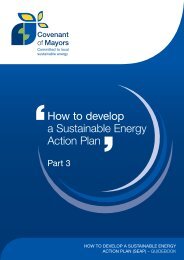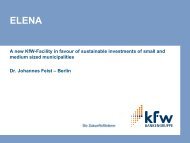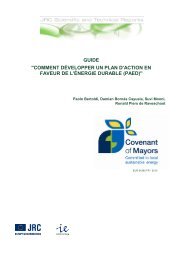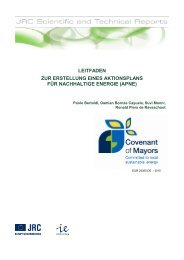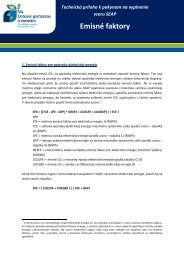English - Covenant of Mayors
English - Covenant of Mayors
English - Covenant of Mayors
Create successful ePaper yourself
Turn your PDF publications into a flip-book with our unique Google optimized e-Paper software.
What to ask?<br />
It may be tempting to ask a lot <strong>of</strong> questions in the<br />
questionnaire (e.g. is your building insulated, do you have<br />
solar panels, have you recently done energy efficiency<br />
improvements, do you have air conditioning, etc.?). How ever,<br />
it should be kept in mind that it is very important to keep<br />
the questionnaire simple and short (ideally not more than<br />
1 page), in order to obtain a satisfactory rate <strong>of</strong> answers.<br />
Besides the type and quantity <strong>of</strong> energy consu med and<br />
eventual local energy production (renewable, CHP…), we<br />
recommend to ask at least 1 or 2 questions related to<br />
variables that can explain the energy consumption (for<br />
comparison or extrapolation purposes), for example floor<br />
space (m²) <strong>of</strong> a building, and/or number <strong>of</strong> inhabitants, or<br />
number <strong>of</strong> pupils in a school, etc. For industry or services,<br />
ask the branch they belong to (propose some categories,<br />
if possible). For the residential sector, it is useful to ask<br />
questions that would allow extrapolation <strong>of</strong> the collected<br />
data. This depends on what kind <strong>of</strong> statistical information<br />
is available at the municipal level. It could be for example:<br />
household size (number <strong>of</strong> occupants), class <strong>of</strong> revenue,<br />
location (postal code and/or rural/urban area), dwelling type<br />
(detached house, semi-detached house, apartment), size<br />
<strong>of</strong> the dwelling (m²), etc.<br />
Tips:<br />
• Make sure the questions are clear and precise so that<br />
they will be understood by all in the same manner.<br />
Provide some short instructions if necessary.<br />
• To increase the amount and quality <strong>of</strong> answers, inform<br />
clearly about the purpose <strong>of</strong> the questionnaire (energy<br />
statistics and not tax purpose for example). Motivate<br />
people to answer (for example, inform that the<br />
questionnaire allows to measure progress in reaching<br />
the CO 2<br />
reduction objectives <strong>of</strong> the local authority, or<br />
provide any other incentive you find relevant).<br />
• Make the inquiries anonymous (especially in the<br />
residential sector) and explain that the data will be kept<br />
confidential.<br />
• Do not hesitate to send reminders to those who do not<br />
reply on time, in order to increase the rate <strong>of</strong> answers;<br />
and to call directly the largest energy consumers to<br />
make sure they reply.<br />
• Make sure that the collected data sample is representative<br />
<strong>of</strong> the population. You should be aware that the<br />
response rate is generally low and those who respond<br />
are generally the most educated and climate-aware,<br />
and therefore there is the risk that the data collected is<br />
strongly biased, even if the questionnaire was addres sed<br />
to a representative sample <strong>of</strong> the population. To avoid<br />
this, it may be advisable to organise data collection via<br />
face-to-face or phone interviews, especially in the<br />
residential sector.<br />
• Decide in advance what you want to do with the data<br />
collected, to make sure that you really ask the useful<br />
and necessary questions.<br />
• Do not hesitate to get the help <strong>of</strong> specialists (statisticians)<br />
to design your inquiry.<br />
• It is advisable to communicate in advance your aims<br />
(SEAP development) through the local media, explaining<br />
the context and expected benefits for your local<br />
community.<br />
What to do with the data?<br />
Generally speaking, data collected via inquiries should<br />
help you to construct the energy and CO 2<br />
data related to<br />
the territory <strong>of</strong> the local authority. Here are a few examples<br />
<strong>of</strong> possible usages:<br />
• Aggregated data should be broken down into sectors<br />
and sub-sectors, in order to target your actions and<br />
measure the results achieved by different target groups.<br />
• Extrapolate some ratios obtained from the sample to<br />
the overall energy consumption. For example if you<br />
know the overall energy and gas consumption <strong>of</strong><br />
a given sector, but you do not know its heating fuel oil<br />
con sumption, you could extrapolate the electricity/fuel<br />
oil ratio or natural gas/fuel oil ratio <strong>of</strong> your sample to the<br />
whole population, provided your sample is representative.<br />
4. Making estimates<br />
From data collected via a sample <strong>of</strong> the population (see<br />
above), you could estimate the overall consumption. For<br />
example, from the sample data you could calculate the<br />
energy consumption per square metre or per inhabitant<br />
in the household sector for different types <strong>of</strong> buildings and<br />
different classes <strong>of</strong> revenues, and extrapolate to the entire<br />
sector using statistical data related to the territory <strong>of</strong> the<br />
local authority.<br />
Ideally, this kind <strong>of</strong> exercise should be done with the help<br />
<strong>of</strong> statisticians to make sure the data collected and method<br />
<strong>of</strong> extrapolation provide results that are statistically<br />
meaningful.<br />
In addition, checks should be carried out to make sure<br />
that the overall results are compatible with the data<br />
available at a more aggregate level.<br />
Notes<br />
• If energy consumption data cannot be disaggregated<br />
between individual sectors (i.e. residential, services and<br />
industry), then report the total consumption in the<br />
template and do not fill in the data at the sector level.<br />
• If the data collected do not allow the possibility to<br />
distinguish the municipal consumption from other<br />
usages, then there is a risk <strong>of</strong> double counting. To avoid<br />
this, subtract the municipal usage (calculated separately,<br />
see above) from the overall energy consumption <strong>of</strong> each<br />
sector and report each <strong>of</strong> them in the relevant section<br />
<strong>of</strong> the template.<br />
21




